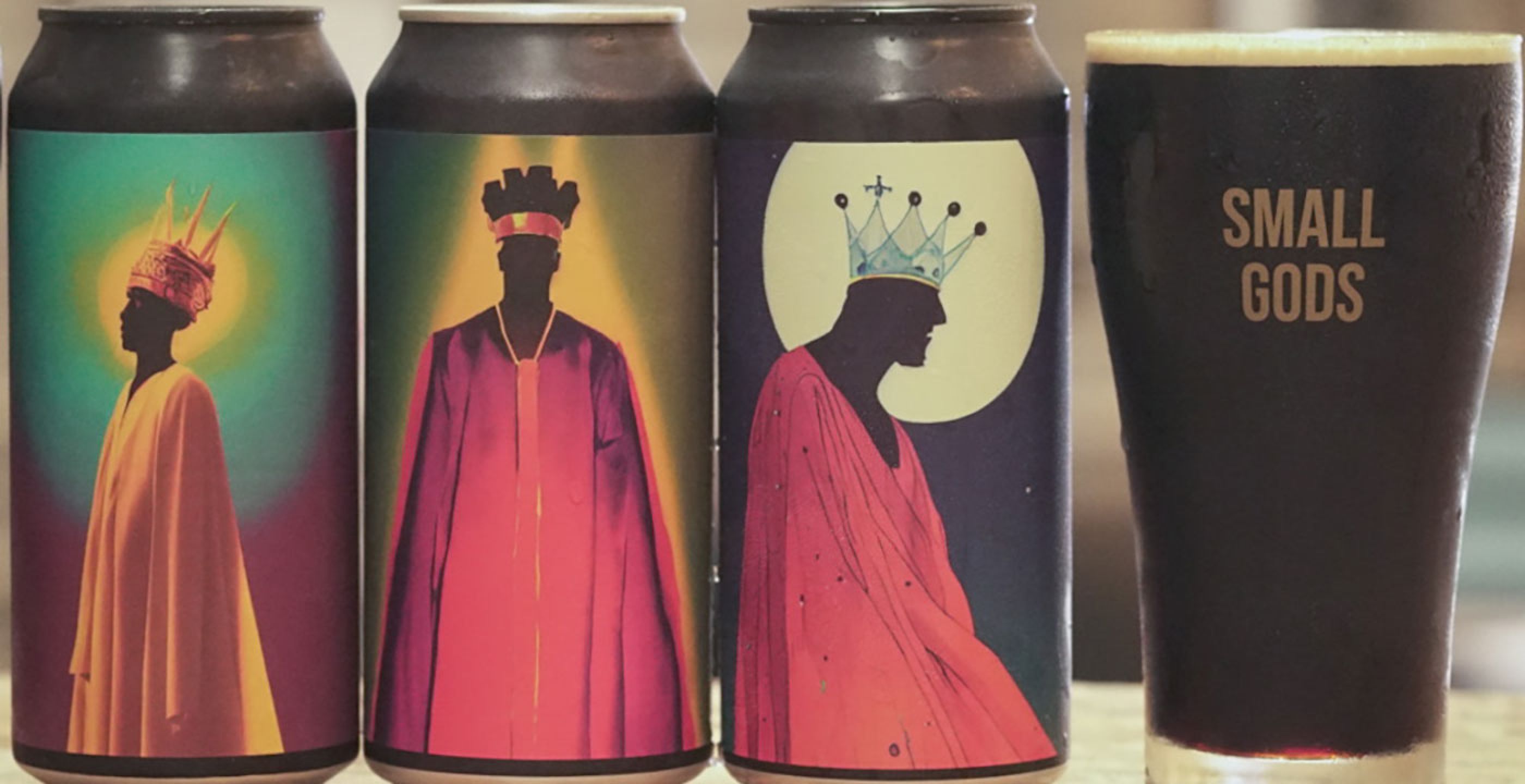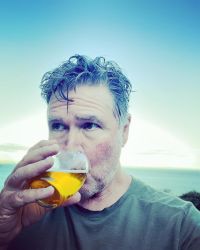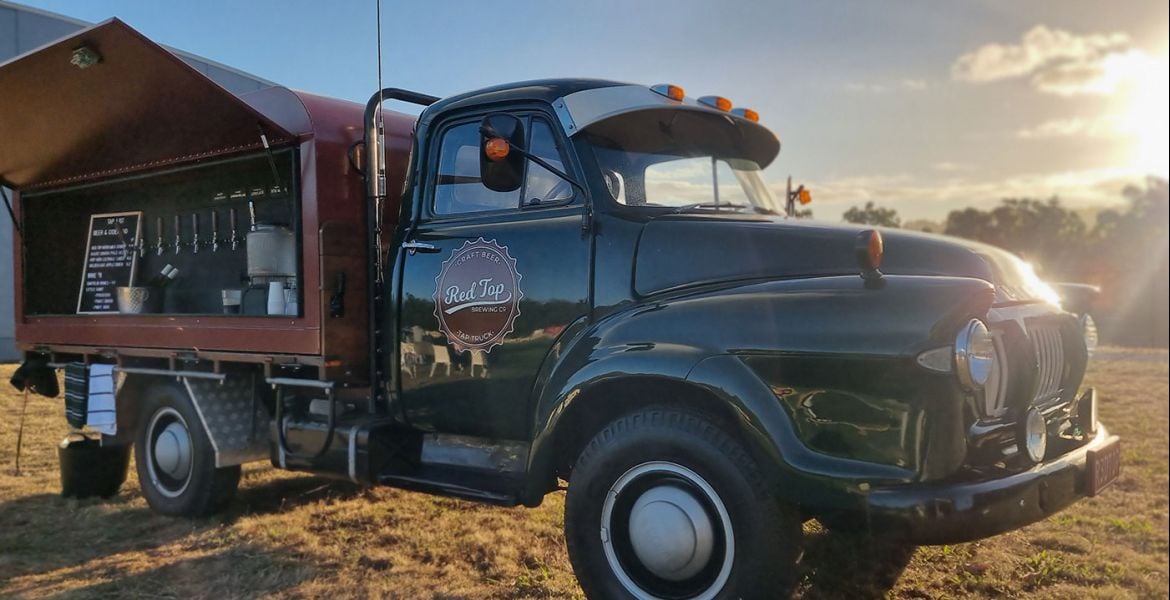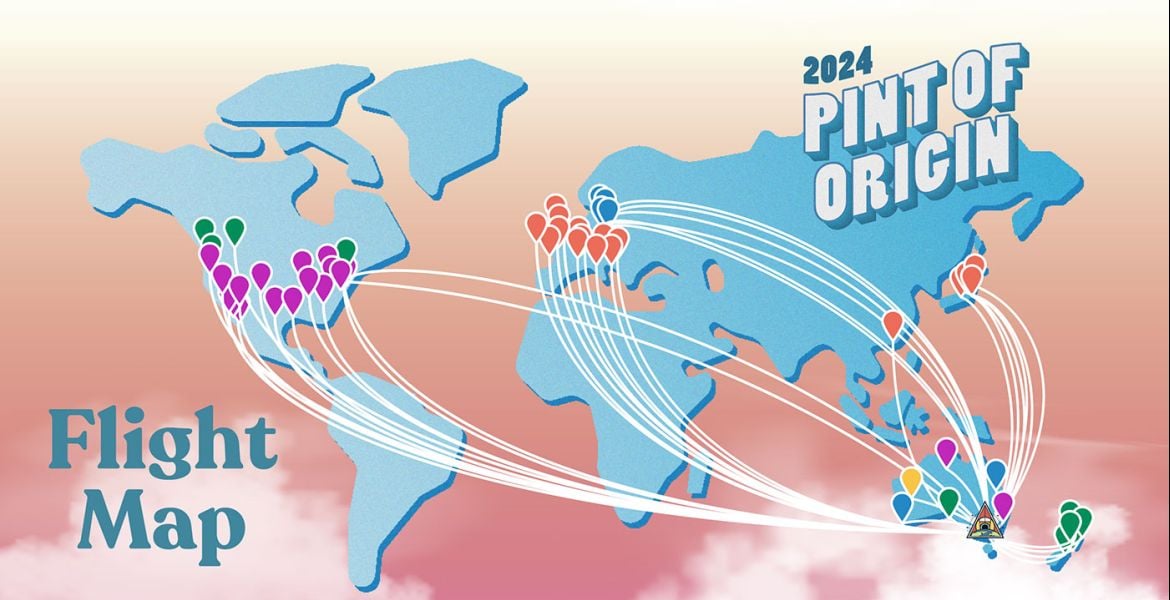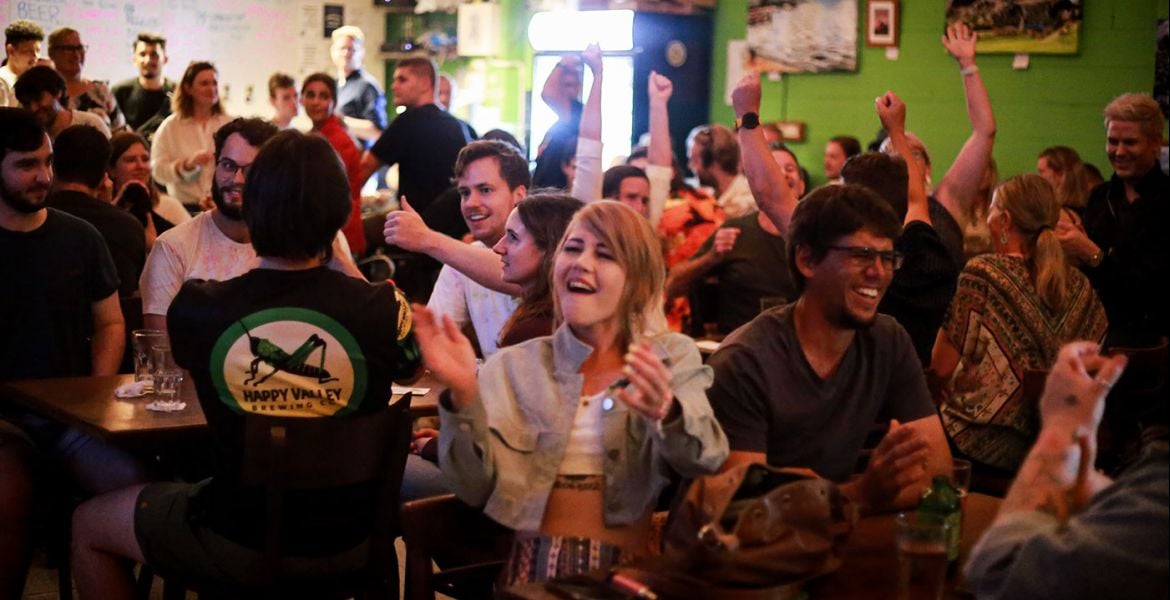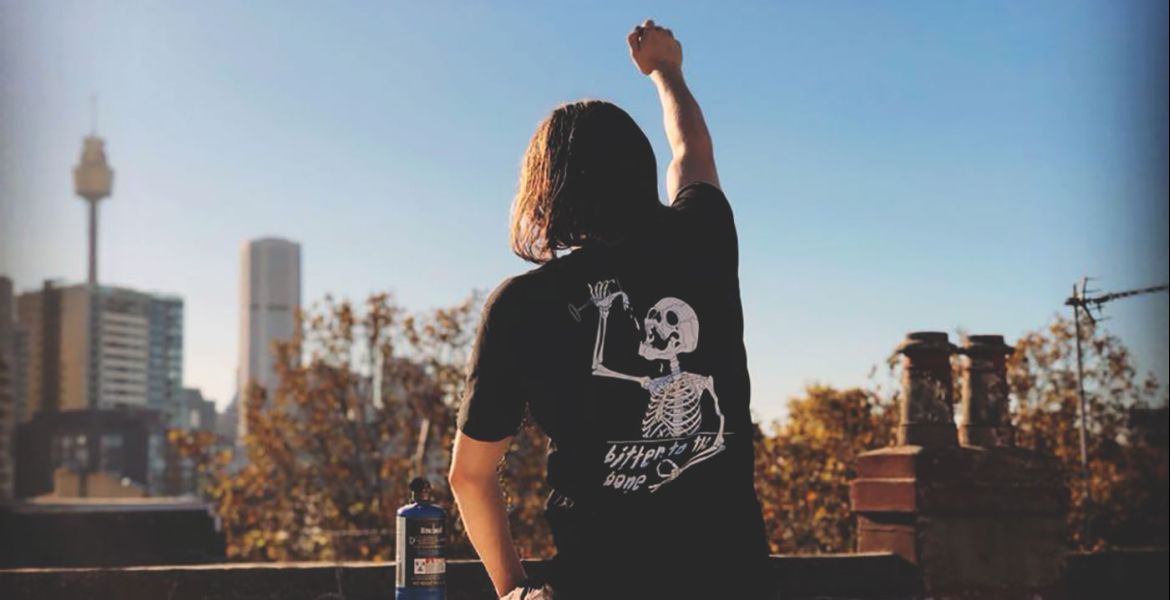Poetry, art, magazines, books, album covers, mythology, history … drag queens – the well from which Small Gods draw their inspiration is far removed from usual hop puns and pop culture references that service the wider craft beer community.
The tiny, experimental Auckland brewery don’t just think outside the box, they break the box and put it back together in a different shape.
How else do you explain a brewery that made their debut with an otherwise extinct beer they discovered by reading the Diary of Samuel Pepys?
“I read about Mumme in Samuel Pepys’ diary,” Small Gods co-founder Luke White says. “He was writing about how they’d go to the Mumme House and get drunk, and I was like, ‘Hang on, what’s a Mumme?’
“It turns out it was an extinct beer style regarded as so viscous you needed a knife and fork to cut through it. It’s extremely bitter, 12.5 percent, and brewed with blessed thistle and cardamom.”
For the debut beer, the brewery-less Small Gods approached Wellington’s Double Vision Brewing to see if they’d collaborate.
“We said to Double Vision, ‘If we buy 60 percent of the batch will you brew it?’ and they were quick to say yes,” Luke says.
Wait, wait, wait … you might be saying to yourself, how does this work?
And this is where we explain the complex antecedents to Small Gods.
England-born Luke’s career in beer started when he had the idea to set up a beer subscription service called Beer Jerk. The original offer was to buy a case of 12 beers but drink only one per week. So, every Thursday, Beer Jerk subscribers would open the same beer and then talk about it in a Facebook group.
The logistics of the enterprise are astonishing. Every new customer joins the “club” on the same beer as everyone else. So Luke is always planning at least 12 beers ahead.
Luke also has another operation, an Auckland taproom formerly known as Fridge & Flagon, but for reasons we’ll get to, has changed its name to Small Gods Taproom.
So, for any Small Gods beer, there were always several outlets: a Beer Jerk subscription box, the Beer Jerk online store, the Fridge & Flagon, and the brewing partner could also sell some. And rarely do these beers see the inside a supermarket, bottleshop or pub. But remarkably some are now getting to Australia.

The fact they’ve now brewed over 50 beers is a testament to the success of the niche system.
These days they still brew with partners, but increasingly they brew under contract at a facility in west Auckland.
The name Small Gods dates back to Luke’s days before he was in the business of beer. He used to homebrew with a friend and they named their plastic fermenter “Small Gods” – a reference to a Terry Pratchett book in the Discworld series. But also, Luke says, a reference to the magic of yeast.
The genesis of Small Gods as a business happened after a late-night meeting between Luke and his future brewing partner Matt Eats.
One of Luke’s early on-premise ventures was known as The Beer Jerk Bunker: a small underground bar in Symonds Street on Auckland’s city fringe. It had a cult following and poured rare and interesting beer. Matt was out celebrating his birthday with friends and got talking to Luke, who was behind the bar.
“The bar just had an incredible beer selection,” Matt recalls.
As Luke remembers it, Matt was at the end of a great night but ditched his mates to talk beer with Luke.
“Matt had just got back from overseas and he kept saying, ‘What you’re doing is so cool and so exciting. Are you looking to hire anyone?’ I said, ‘Join your friends, call me tomorrow.’ And Matt was like: ‘But if you need anyone to work with you…’
“He gave me a call the next day. At that stage Beer Jerk was tiny and we didn’t have a job, but he joined us and made his own job.”
Matt’s entry into the beer business was driven solely by passion and a chance connection when he was working in Australia. Before beer he was selling kids' scooters.
“I was sent to Melbourne to open the Australian office for Micro Scooters and I looked after sales and marketing there," Matt says.
“My neighbour in Melbourne was a brewer at Mountain Goat [Max Edney] and we became mates. At the time I was starting to homebrew so I'd drop bottles of homebrew to him and he'd drop me some Mountain Goat beers. We got chatting and the switch just clicked – this was an industry I was interested in.
“When I got back to Auckland after my honeymoon in South America I made a big spreadsheet of every brewery and bar in the city and started harassing them all until one of them gave me a job!”

He got a job as a bartender at Brothers Beer, which started as an uber-cool freehouse before moving to brewing their own beer.
“In the space of a few months I went from bartender to assistant manager to site manager," Matt says. "Eventually, I became marketing manager and then general manager.
“Brothers were moving towards their own beers and what I was into was the fridges and the off-premise selection. When I went into The Beer Jerk Bunker I saw they were doing exactly that but at the next level … and I thought, ‘That’s the company I want to be with. They share my vision and I’m just going to nag them until they give me a job because that’s where I want to be.'”
The pair worked together in Beer Jerk and Fridge & Flagon, with Small Gods evolving from their shared desire to create rare and interesting beers for the craft geek ecosystem.
Officially Matt is the brewer and Luke is the sales force, but the essence of the operation is a shared love for the offbeat, obscure, different and daring. What they create depends on what angle they come from; it might be an old style recreated, such as Mumme, or a beer based on a chance encounter with a drag queen.
“Sometimes it’s the ingredients,” Matt says. “Sometimes the story, sometimes it’s an historical recipe – sometimes it’s story first, sometimes it’s art first, or ingredient first or tradition. Each beer has a clear point of origin and focus.”
Forbidden Fruit is a classic example of what drives Small Gods.
It was 4am on Auckland’s lively K Rd (short for Karangahape Road), when Luke was introduced to a beautiful, Amazonian-tall woman in enormous heels.
Elektra Shock, a star of Ru Paul’s Drag Race Down Under, transpired to be a fellow beer lover. Her alter-ego James Luck phoned Luke the following Monday morning about the prospect of brewing a beer together. About a month later, Forbidden Fruit, a banana milkshake Hefeweizen, was born.
To go with the idea of a banana milkshake, the pair hot-glued straws to the side of the cans – an added experience for customers so inclined to drink beer through a straw but also a hat-tip to the beer’s origin story and the fact that drinking from a glass risks messing up an artfully applied lipstick.

The beer that opened doors, pushed boundaries and drove Small Gods into new places and involved an equal amount of hand-crafting, however, was Satan Satan Satan, a gunpowder bock.
“This was the beer that made us realise we didn’t have to work with another brewery ... it was the beer that got us into contract brewing,” Matt says.
They wanted to brew a beer with brewing consultant Mike Cheer, aka Maltkult, who is also a death metal musician.
“Mike didn’t have a brewery and neither did we, so that’s how the contract deal came about, and after we did it we thought, ‘That was really easy’ and it opened our eyes to doing things by ourselves rather than just collaborations.”
That beer also pushed the envelope on ingredients, using gunpowder – actual gunpowder – as an adjunct.
It was the start of the series which also featured a fig dubbel and a whisky-fortified Scotch ale – with the triptych design representing Lucifer’s journey from angel, through betrayal, to fall and fiery fate. Over countless hours, Luke and Matt hand-dipped each of the cans in wax melted in a slow-cooker while recording episodes of the Beer Jerk podcast.
That series won a packaging award at the New Zealand Beer Awards and announced Small Gods to a potentially wider audience.
“From a creative standpoint," Luke says, "what we did with Satan really pushed the boundaries on what can be done with beer.
The following Christmas they flipped the idea around with Satan becoming Santa for a series of three festive beers, two of which were collabs with Australian breweries Moon Dog and Molly Rose.
The relationship with Australia is strong, with Beer Jerk importing several Australian breweries into New Zealand, as well as driving a trans-Tasman collaboration that paired Kiwi breweries with Aussie counterparts to create a dozen beers sold on both sides of the Tasman.
“When we import, we’re not bothered with nice pale ales, we want to import the likes of Boatrocker and amazing barrel-aged beers,” Luke says.
And now Australia is reciprocating, with Small Gods beers crossing the Tasman through Modern Liquid (for much the same reason: a point of difference).
“Because the cans look cool is a major thing in our favour, and the point of difference in styles was another thing. When everyone is making hazy pale ales, you can zag when everyone else is zigging.”

Possibly one of the most ambitious Small Gods creations has become its most celebrated – and possibly most widely sold beer. Desperate Glory was this year’s Supreme Winner at the New World Beer & Cider Awards (New World being a supermarket chain in NZ).
An Oud Bruin or Flanders brown ale, Desperate Glory was a collab with 8 Wired – two collabs in fact.
The beer started life as Three On A Match, a Belgian amber ale released in late 2021. When they were talking to 8 Wired’s Søren Eriksen about brewing it, his view was that he’d struggle to sell a lot of Belgian amber ale.
Luke says: “As we were putting it together, Søren said, ‘What size batch do you want to do? I don’t think I can sell loads of Belgian amber ale’. Søren suggested doing a normal batch and then splitting it and doing something else with the other half.
“Like putting it in these barrels,” Luke replied, gesturing towards 8 Wired’s huge collection of wooden vessels.
The beer spent a year on oak but it also featured a strange addition (because these guys have to be different): Chinese Keemun tea.
“I’d once had this Italian stout made with tobacco leaf and it was amazing,” Luke says. “The tobacco leaf character is so nice, but we couldn’t use tobacco leaf here. I was speaking to a chef friend and he said ‘Have you tried Keemun tea?’
"It’s lightly smoked and we worked with Søren on dosing levels so that smoky tea is one of the layers in there.”

The name of the original beer – which went out to Beer Jerk subscribers on Armistice Day 2021 – is a reference to a World War I story, and Desperate Glory is taken from a line from a poem by celebrated war poet Wilfred Owen. The sparse imagery, a single shovel, is a quiet acknowledgment of the men who fought in the trenches and gave their lives in Flanders.
Matt: “When we created Three On A Match the question was, ‘What do you think about when you say Belgian and brown?’, and Flanders Field comes to mind, and the trenches.”
Matt recalled a story about soldiers sharing their precious ration of matches by lighting three cigarettes off one match.
“It was considered bad luck to be number three in a match. When the first person lit the match, the sniper on the other side would see it, when the second person lit his cigarette, the sniper would aim, and when the third cigarette was lit, he would shoot.
“We followed that on with Desperate Glory. I love the war poets, and Wilfred Owen’s Dulce et decorum est is one of the most powerful pieces of poetry I’ve ever read, and there’s that line in there that goes:
My friend, you would not tell with such high zest
To children ardent for some desperate glory,
The old lie: “Dulce et decorum est Pro patria mori.”*
“It’s such a cool name to tie back into that theme and the shovel on the label references back to the single match on the label of Three On A Match.”
As a result of winning Supreme Champion, Desperate Glory is ranged in over 120 New World supermarkets up and down New Zealand.
“This is a huge achievement for us,” Luke admits. “When Søren told us about it, I thought, ‘What does this mean? Will people hear about Small Gods?’
“The reason we haven’t won many awards – or none really – is because we haven’t entered any. We don’t sell in supermarkets and we hardly sell to anyone in the trade. Everything we brew we sell out ourselves so there’s no point in entering competitions.”
(In fact, they have won some awards in the past. They took out that packaging trophy in 2021 with the Satan Trilogy series of waxed cans. And Black Narcissus – the 12.5 percent ABV Mumme they brewed in collaboration with Double Vision – won a gold medal at the 2019 awards.)

But this is next level, given the heavy promotion and awareness that will come with the awards, which makes it a little daunting, says Luke.
“I am a bit scared that when Desperate Glory is promoted as the best beer in New Zealand someone will pick it up at the supermarket only to find it tastes like vinegar … will it upset people?”
He’s only joking; while Desperate Glory is on the acidic side, it’s an amazing beer with enough sweet notes and a huge depth that brings dried fruit, mocha, cherry, vanilla and a tannic smoky note. Matt, who designed the original beer, said he wanted layers of flavour from different adjuncts.
“There’s date syrup and palm sugar in there – I’m a big fan of alternate adjunct sugars rather than using dextrose so you can build in layers of flavour and create a bit more dryness from more fermentable sugars. There’s a strong malt complexity but you also have the Belgian yeast character coming over the top.”
The sparse imagery on Desperate Glory is typical of Small Gods; in fact, most of their labels are there for the “look” and conveying information about the beer is secondary.
To an extent this evolved out of selling them through the Beer Jerk subscription: subscribers got a bunch of tasting notes, a backstory and much more, such as a video about the beer.
“We have this unique platform where we don’t have to put words on the can because people are buying it online or through subscription and they can read the words there,” Luke says. “People can read about it before they buy it, and when they get it the label is almost an art piece. The cans are certainly not designed for retail shelving.”

Luke says one of the inspirations for this approach is Empire magazine.
“As a teenager, I’d buy Empire from newsagents, but if you subscribed you got a magazine with a different cover; maybe an awesome image of Darth Vader’s face. The one in the newsagent had to have all the text on it to persuade people to buy it. We don’t have to persuade people to buy our cans so we can have something that’s an art piece.”
Matt adds: “And if people don’t get it, that’s cool. If it’s the Beer of the Week on Beer Jerk we can also explain it on the video.”
Luke: “As more people are drinking at home you get a treat, an experience, a little story, something you can hold and appreciate. We treat them like book covers or album covers.”
Both Luke and Matt are co-creators of the beer and the artwork, doing a lot of the can art themselves.
Luke has a fine arts degree and by his own admission “is pretty good with Photoshop” while Matt is self-taught on the design front.
“Luke is more artistic and I’m more minimalist – stripped back and clean lines,” Matt says. “I taught myself through playing around but the only A I ever got at school was design, and when I was considering what to do at university it was the design route, but I did drama instead. One of my major regrets is that I didn’t learn design.”
The pair will share ideas and help each other improve what they do, which was easy when they were both working together at Beer Jerk, but last year Matt set off on a different journey: working in sales and marketing for a startup brewery, Pacific Coast Beverages. He's found he has no trouble balancing the work demands between two breweries.
“Because I’m sales and marketing for Pacific Coast and head brewer for Small Gods, I don’t touch sales for Small Gods and I don’t talk to anyone about Small Gods when I’m working for Pacific Coast,” he says. “That’s the church-and-state element of it.
“Small Gods is evenings and weekends and weekdays is Pacific Coast … I keep a very clear line.”

While there’s more cross-over for Luke, he also has two hats: “Beer Jerk is my job and Small Gods is my hobby. We’re enthusiasts at heart; no-one is making us brew these beers; we don’t have sales targets. It’s just fun and no pressure. We’re loving it.”
While ideas bounce back and forth, each partner has a right of veto, “which is why we have so few smoked beers,” Matt says. “I veto those! I push the floral and herbal – if it’s smoky, you know it’s Luke.
“The basis of our friendship is that we enjoy the same things and have similar tastes, but it’s the ability to bounce ideas off each other and take a different angle.”
Luke recently made the move to change the name of Fridge & Flagon to Small Gods Taproom and the long-term dream is a Small Gods brewpub.
“That’s what I’m most into: the brewing side, rather than retail on the internet, but I don’t have clarity yet about what it will look like.”
While the Small Gods Taproom might stay in its current place, Small Gods beers will keep pushing into new spaces.
Matt says they’ll keep looking to brew “something no one else is doing”.
Luke adds: “It’s a small market but that suits us. There are enough people that are like us that we can move a batch of beer of something that's extraordinarily strange.”
Small Gods beers are available in Australia through Modern Liquid (which was previously known as Better Beer).
*The Latin in the poem translates to: “It is sweet and fitting to die for one's country.”
Photo at top of article features Small Gods' Magi beers: Gaspar, Melchior and Balthazar.




